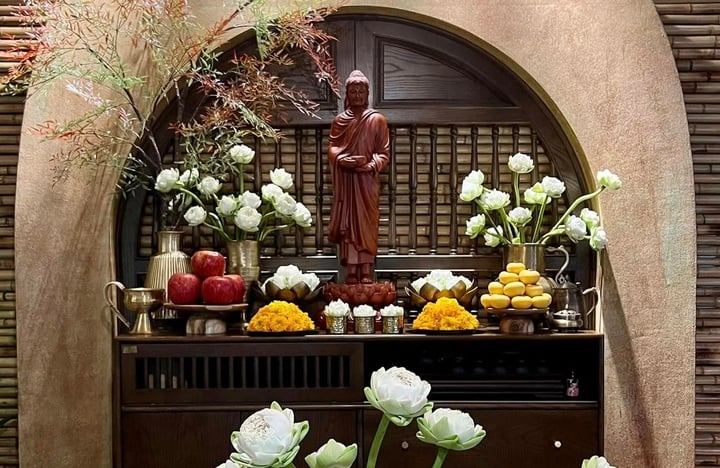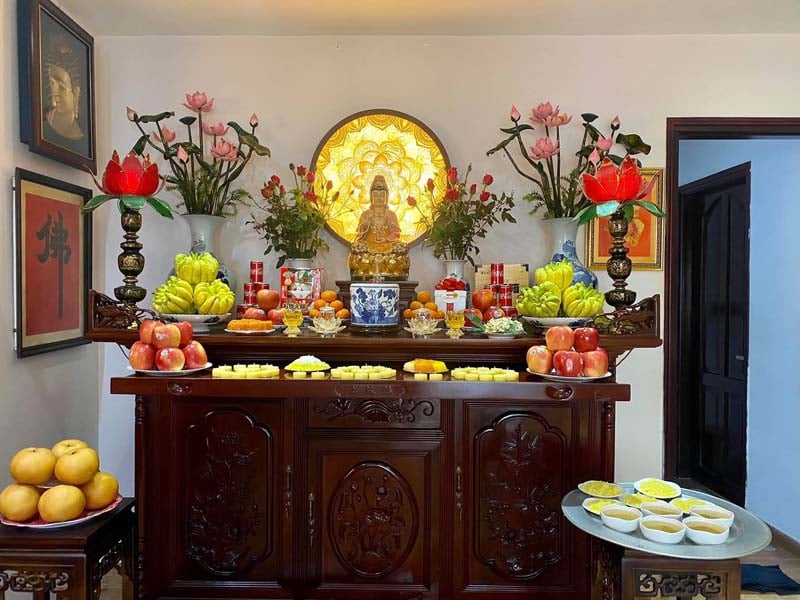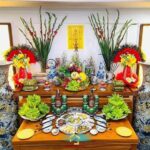In worship, every detail on the altar holds separate spiritual and feng shui significance. One of the less-known principles that many wealthy and successful families quietly adhere to is always placing the flower vase on the left when offering incense. This seemingly minor detail holds a system of ancient feng shui beliefs that not many are aware of.
The “Left Flower, Right Fruit” Principle – Proper Feng Shui Setup for Altars
Since ancient times, our ancestors established a rule for arranging offerings on the altar from the perspective of the person offering incense: the flower vase on the left and the fruit plate on the right. This is not a rigid rule but a harmonious and proper arrangement according to yin and yang and the five elements.
In feng shui, the left (Green Dragon) represents yang – positive energy, movement, and prosperity; while the right (White Tiger) belongs to yin – stillness and protection. Placing flowers – a symbol of freshness, growth, and new beginnings – on the left activates positive energy, bringing prosperity to the family. Meanwhile, fruits – representing achievements and accumulation – are placed on the right, implying preservation and maintenance of blessings.

Many affluent families, understanding these feng shui principles, maintain the “left flower, right fruit” setup to preserve wealth and the solemnity of the worship space.
Beyond Feng Shui – The Left-Side Flower Holds a Profound Symbolic Meaning
Apart from feng shui considerations, placing the flower vase on the left also carries traditional cultural and spiritual values.
Fresh flowers symbolize reverence and purity and are offered to ancestors and deities. Placing flowers on the left – the side symbolizing the “heart” and the source of life – is a way to express profound respect for the deceased. Additionally, offering flowers conveys the intention of “presenting the best” with the hope of receiving blessings and protection.
During festivals, full moon and new moon days, or death anniversaries, families well-versed in rituals often choose fresh flowers, arranging them neatly and always placing them in the correct position to avoid disturbing the spiritual layout of the altar.
The Wealthy Are Not “Superstitious” – They Understand How to Preserve Wealth Through Caution
Some may view the practice of placing the flower vase on the left as a “superstitious” act or mere habit. However, successful individuals, particularly entrepreneurs, tend to value feng shui and spiritual factors. They believe that peace and success stem from maintaining a pure spiritual space and adhering to proper rituals.
Several homeowners share that, after rearranging their altars according to the “left flower, right fruit” principle, the atmosphere in their homes became calmer, their businesses thrived, and their descendants lived in greater harmony with fewer disputes.
In reality, this is not a magical or mystical phenomenon but a result of directing positive energy, tending to the sacred space, and thereby creating a positive energy field that spreads throughout the home.

Arranging Altar Flowers the Right Way – For Beauty and Feng Shui
- Choose fresh flowers; avoid using artificial, wilted, or overly fragrant flowers.
- Suitable flower types include lotuses, chrysanthemums, gladioli, and white lilies – symbols of nobility, filial piety, and reverence.
- Avoid overly elaborate arrangements that may obstruct the view of the deity statue or tablet.
- Select a vase of moderate height with a simple design and elegant color.
- Change the flower water daily to prevent negative energy and maintain freshness.
- Place with sincerity, and all good things will follow.
Without being overly elaborate or superstitious, placing the flower vase on the left when offering incense is a beautiful tradition with profound meanings. For our ancestors, it was a way to show respect and uphold spiritual rules. For modern individuals, it serves to awaken positive energy and balance living spaces.
3 Types of Plants to Bring Good Fortune and Peace to Your Home
“Elevate your surroundings and invite prosperity with these three exquisite ornamental plants, carefully selected for their beauty and positive feng shui energy. These plants are known to stabilize and enhance the energy flow in your home, attracting wealth, luck, and fortune for the entire family.”
Wealth-Attracting Money Tree: The Two Ages You Should Never Plant This Tree, the Greener It Gets, the Worse Off You Are
“Age-old beliefs and superstitions often guide planting traditions, with some cultures believing that certain ages are inauspicious for specific plants. In this context, the statement ‘2-year-olds shouldn’t plant money trees’ is intriguing. Is there any truth to this claim, and if so, which ages are ill-fated for financial prosperity through horticulture?”





































